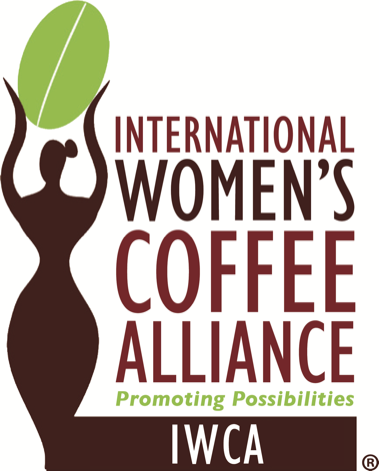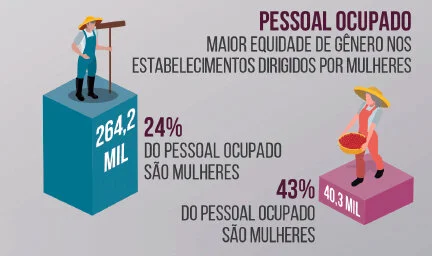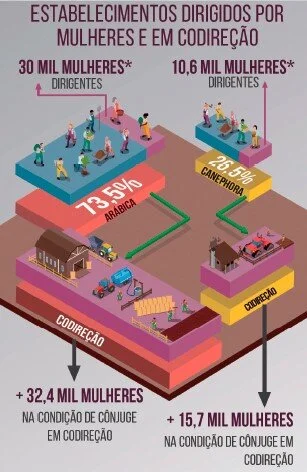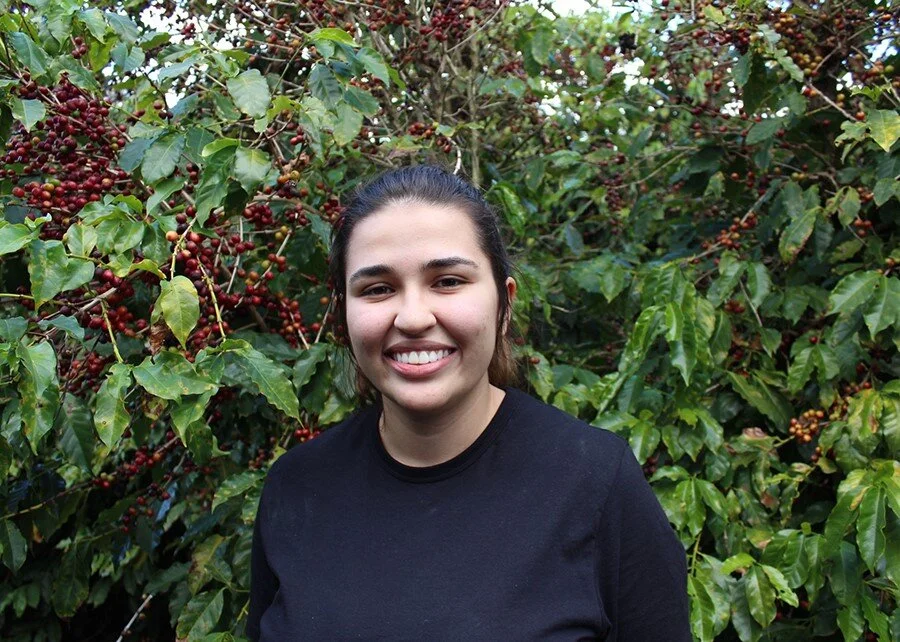Unprecedented Research Shows the Participation of Women in Coffee Production
This article was translated into English. The original article, published in Portuguese, can be found at the link HERE.
Highlights:
In relation to the area of the establishments, women are responsible for 815 thousand hectares (ha), which corresponds to only 9.1% of the total.
Analysis was carried out by researchers from Embrapa and Epamig based on IBGE data.
A study also showed that women have less access to production technologies and associative entities.
In establishments run by women, there is more gender equity.
Results aim to support institutional actions and public policies so that women find opportunities and have access to goods and services in the same way as men.
More than 40 thousand Brazilian agricultural establishments producing coffee are run by women. This number is equivalent to only 13.2% of the existing 304.5 establishments. In addition to the managers, there are also those who are co-managing spouses, 32,400 women in Arabica coffee establishments, and 15,700 women in Canephora coffee establishments. Thus, it can be said that there is a female audience of 88,700 women running and co-managing coffee establishments throughout Brazil.
This information was extracted from the data analysis collected in 2017, in the last Agricultural Census carried out by the Brazilian Institute of Geography and Statistics (IBGE), which for the first time brought data on gender in coffee production. The work was prepared by researchers Helena Alves, from Embrapa Café1; Cristina Arzabe, from the Department of Intelligence and Strategic Relations at Embrapa; and Margarete Volpato, from the Agricultural Research Company of Minas Gerais (Epamig), with support from Marcelo Oliveira, from IBGE. The information was organized in a didactic way, in infographics in the Women in Coffee (Mulheres Cafeiculturas) folder. The work was presented at Expocafé Women, a special exhibition2 of Expocafé 20213.
According to Alves, until recently, the absence of women at the opening tables of coffee events or on the boards of cooperatives, rural unions or entities representing the sector led to a misperception that, in Brazil, women do not play a role relevant in coffee growing. But it's just the opposite. “The contribution of women throughout history has been fundamental both in production and in research, in management, marketing and in all other sectors of this agro-industrial system”, she says.
In relation to the area of the establishments, women are responsible for 815,000 hectares (ha), which corresponds to only 9.1% of the total. Most of the properties (72%) are in the Southeast, with just over 29,000 rural establishments, followed by the Northeast, which has 5,860, or 14% of properties run by women. The North has 3,119 properties (8%), the South with 1,586 (4%) and the Center-West with 663, which is equivalent to 2% of the total.
Less Access to Technologies
The results also show that these women have less access to the internet or other forms of disseminating information, such as technical meetings or seminars, participate less in associative activities and have less access to technologies such as irrigation, implements, machines and tractors. “However, women leaders hire more women and provide more opportunities for other women. In establishments run by women, there is greater gender equality when it comes to employed persons, with 43% of this contingent being female, while in establishments run by men, the percentage of employed women is much lower, equal to only 24% of the total”, reports Alves.
Researcher Helena Alves says that until recently it was difficult to characterize women in Brazilian coffee, which is a very diverse group, as there was no statistical data or systematic information. “This triggered a movement instigated by journalist and coffee woman Josiane Cotrim, which culminated in the publication, in 2018, of the book Mulheres dos Cafés no Brasil (Women in Coffee in Brazil)4”, she emphasizes. The book was created by a multidisciplinary network of 41 authors and several collaborators who, through a joint effort, offered the first profile on women in coffee in Brazil, with an emphasis on rural women.
For Cristina Arzabe, it is important to gather and disseminate data so that objective picture of reality can be obtained and it is possible to justify public policies that leverage gender equality and the strengthening of rural women and girls. She also points out the e-book SDG 5 - Gender Equality: Embrapa's contributions, in which inequalities between women and men in rural areas are discussed. “These are structural inequalities, in which women and the black population have the worst socioeconomic indicators. Census data carried out by the IBGE make it possible to objectively visualize these inequalities, in quantitative terms, and thus justify the efforts to achieve gender equality, considered essential for development and peace in the world”, she says.
Helena Alves adds that, based on this information, public policies and institutional efforts must be made to increase rural women's access to goods and services to achieve a fairer and more balanced society. “In particular, it is necessary to focus on goal 5 of the Sustainable Development Goals (SDG 5), which calls for reforms to give women equal rights to economic resources, as well as access to property and control over land and other forms of property, financial services, heritage and natural resources, in accordance with national laws”, she points out.
She believes that the empowerment of rural girls and women, as well as all segments of the coffee agro-industrial system, is crucial for the eradication of poverty in all its forms, for the end of hunger and the achievement of food security and nutrition, for the promotion of good health, well-being and education and for the promotion of development and inclusive and sustainable coffee growing.
The researchers say that studies like this are important contributions for Brazil to achieve the goals in relation to gender equality in agriculture. “Gradually, Embrapa has offered opportunities and recognition to research, development and innovation (RD&I) projects aimed at the female audience or with specific actions for rural women, with actions or Information and Communication Technologies (ICTs) designed to leverage the rural women's access to knowledge, information or the market, for example”, explains Arzabe.
Photo: Eduardo Vilela
"I Had to Overcome Prejudices at Home"
At just 26 years old and already with important experiences related to coffee, including international ones, rural producer Isabel Vilela, from Campo Belo (MG), tells how strong the prejudice against the role of women in the countryside, particularly in coffee production, is still strong. She is the daughter of a rural producer, but was never involved in property issues. “I learned about the importance of coffee growing when I went on an exchange program during high school in Finland, the country that consumes the most beverage per capita.
'“I didn't even know a coffee tree plant”, she recalls smiling. Her father prepared Isabel's brother for succession in managing the farm that also produces grain and milk. She says that everything changed for her when she learned that, alongside the university where she was studying International Relations, the International Coffee Week would take place. “I signed up to work as an interpreter at the event and learned that an International Alliance meeting was taking place of the Coffee Women - IWCA Brazil. I was curious and scared when I saw an auditorium full of women debating the subject. I thought: Wow!! There's room for women in coffee." From then on, she fell in love with coffee, took several courses in the area, worked as a volunteer and later as executive manager of IWCA Brazil. But despite some people encouraging her, Vilela says that she had to overcome barriers, including in relation to her father, who told her: “Isabel, coffee is not for women”. “At the IWCA I learned heartbreaking stories of women who go through very difficult situations because of succession. There are families that even sell the property because they only had daughters”, she says. Isabel is currently responsible for the financial area of the farm and for the quality of coffee production.
1 Embrapa (Brazilian Agricultural Research Corporation)
2 In Portuguese: https://www.youtube.com/watch?v=l_7M9Gz0Ldg&t=1s
3 Largest coffee agribusiness fair in Brazil and one of the main technology diffusers in the coffee sector.
4. Download at: https://www.embrapa.br/en/busca-de-publicacoes/-/publicacao/1098991/women-in-coffee-in-brazil



